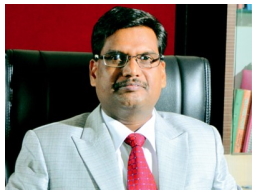Dr. Sanjay S. Kharat
Name: Dr. Sanjay S. Kharat
Email: kharat.sanjay@gmail.com
Contact No: +91 901 107 0912
Executive Summary:
An efficient teacher and an eminent researcher, Proven capabilities as the Principal of P. E. Society’s Modern College of Arts, Science and Commerce to share and hone as an academic prowess as the leader of one of the upcoming and leading college of Pune city in 2008. A die-hard academician and instrumental in instilling a strong sense of discipline among staff and students but also given them adequate freedom in thought and action in order to achieve immense creativity in the field of education.
Education:
- B.Sc. (Bachelor of Science) in Zoology with First Class Shivaji University, Kolhapur
- M.Sc. (Master of Science) in Zoology with First class Shivaji University, Kolhapur
- Ph. D. (Doctor of Philosophy) in Zoology
- Dr. Babasaheb Ambedkar Marathwada University, Aurangabad
- LL.B. (Bachelor of Law) with Second Class University of Pune
- MBA (Master of Business Administration) with First Class Tilak Maharashtra University, Pune
Teaching experience:
- Undergraduate and postgraduate (27 years)
Notable Career Highlights:
- Founder Coordinator, “Certificate Course in Basic Ornithology” Autonomous course run by Abasaheb Garware College, Pune and ELA foundation, Director, Association of Zoologist.
- Honorary Director: Histopathology Department, TOXINDIA, Contractual research organization.
- Life Member, Indian Fisheries Association, Mumbai,
- Fellow, Zoological Society of, Bodhgaya,
- Life Member, Indian Association of Aquatic Biologists, Hyderabad.
- Life Member, The Society for Fisheries Economics and Development, Hyderabad.
- Life member, Indian red Cross Society
- Life Member Board, Progressive Education Society, Shivajinagar, Pune.
- Governing Council Member, Progressive Education Society, Shivajinagar, Pune.
- Member, Senate, Savitribai Phule Pune University, Pune.
Research Experience and Publications:
My research, emphasizes on the diversity, Physiology and Ecology of Freshwater Fishes and the organisms with which they interact, in ecosystem. Laboratory and field experiments are combined with broad-scale comparisons in studies of community organization, population dynamics and life history. I am also working on the diversity of freshwater fishes to understand the distribution pattern .
Research Projects:
Completed many Research Project Funded by Apex Funding Agencies.
- “Acute Toxicity studies of Different organophosphorous ( OP ) Compounds in the fishes namely, Guppy and Garramullya”. TOXINDIA, CO. LTD., PUNE1,25,000/-2015.
- UGC Minor research Project- Study on digestive and reproductive physiology of lepidophagous fish, Neotropius khavalchor, kulkarni, from western Ghats.440000/2015
- Field guide of wild freshwater fishes of western Ghats and Deccan area of western Maharashtra. Published by – PCCF, and Director general of Social Forestry, Maharashtra State. Pune.350000/2015
- BCUD, University of Pune, Research Project – Karyotype Analysis of some fresh water fishes of Mula Mutha river, Pune, Maharashtra300000/2012 5. BCUD, University of Pune, Research Project- Study of Ecology & Diversity of Hill Stream Fishes From Western Ghats of Pune District240000/2008
- Survey of Endemic and Pelagic Birds of Andman & Nicobar Islands funded by Indian Coast guard, Government of in association with Ecological Society of & ELA Foundation1,00000/Jan 2007
- Survey of Indian Peafowl of Morachi Chincholi16/04/2006
- Pelagic Birds survey of Lakshadweep Archipelago funded by Indian Coastguard, Government of in association with Ecological Society of & ELA Foundation1,00000/Mar 2006
- UGC MINOR RESEARCH PROJECT- Prevalence of Trypanosome infection to Teleost fishes from Mula- Mutha River, Pune (MS), .1.50000/2006-07
- DBT funded Bio-Prospecting of biological wealth using Biotechnological tools.50000/May 2003
- People’s Bio-Diversity Register in association with CENTER FOR ECLOGICAL SCIENCES, BANGALORE, funded by MINISTRY OF Environment and Forest.Oct 2002
- DOE Funded Human Resource Development in EGWG Biodiversity Project 1997.
- Ph.D. Guidance:
One Student have completed Ph.D. And Five Students are registered with S.P. Pune University.
Research Expedition:
- Lakshadweep archipelago and Andaman Nicobar Islands for Pelagic Birds Survey in association with Indian Coast guard and ELA Foundation.
Books:
- Reproductive Biology of Hill Stream Fish, Nemacheilus moreh(Sykes).
- E-Book/ VCD on Innovative Teaching of Animal Dissections- Part 1.
- Field guide of wild freshwater fishes of western Ghats and Deccan area of western Maharashtra.
Research Papers:
- Published more than 39 Research Papers in different Peer Reviewed, Indexed high impact factor journals and conferences.
- Sandip D. Tapkir, Sanjay S. Kharat, Pradeep Kumkar & Sachin M. Gosavi (2017) Effects of invasive tilapia on common spiny loach, Lepidocephalichthys thermalis: implications for conservation. Journal of Threatened Taxa (Accepted).
- Sachin M. Gosavi, Sanjay S. Kharat, Pradeep Kumkar, Sushant S. Navarange: Interplay between behavior, morphology and physiology supports lepidophagy in the catfish Pachypterus khavalchor (Siluriformes: Horabagridae). Zoology (2017), DOI:10.1016/j.zool.2017.07.003. Impact factor: 1.51.
- Kumkar Pradeep, Kharat, S. S., Sawant, N. S., Katwate, U., & Dahanukar, N. (2017). Freshwater fish fauna of Hiranyakeshi River, the northern Western Ghats. Journal of Threatened Taxa, 9(5), 10178-10186.
- Nirbay s. Pimpale and Sanjay S. Kharat, (2015): Length- Weight relationship and relative condition factor of Rohitee ogilibii (Sykes, 1839) from Nira River Bhor, Maharashtra World Journal of Pharmaceutical Research, Vol.4(9), 1199-1205. ISSN 2277-7105.
- Sanjay S. Kharat, Nitin Sawant, Kishor Sonawane (2015) Karyotype analysis of some freshwater fishes of Mula and Mutha river Pune, Maharashtra. Dnyanamay, ISSN 2395-6898.
- Nirbay s. Pimpale and Sanjay S. Kharat, (2014): Fecundity and gonadosomatic index (GSI) of Osteobrama vigoressi (Sykes) from Nira River Bhor, District, Pune (Maharashtra), , World Journal of Pharmaceutical Research, Vol.3(6), 1223-1229. ISSN 2277-7105.
- Nirbay s. Pimpale and Sanjay S. Kharat, (2014): Gonadosomatic index (GSI) and Fecundity of Rohitee ogilibii (Sykes) from Nira River Bhor, District, Pune (Maharashtra). World Journal of Pharmaceutical Research, Vol.3(10), 1277-1283. ISSN 2277-7105.
- Ravindra V. Kshirsagar and Sanjay Kharat., (2014): Record of occurrence of Dugesia (Planaria) in fresh water pond, Pune. Journal of Bionano Frontier, Vol. 7(1): 1237-125. Print: ISSN 0974-0678, online: 2320-9593. Impact factor 0.045.
- Sanjay Kharat and Nirbhay Pimpale, (2014): Histopathological studies of Monogenean parasite Diplozoan paradoxum(Nordmann, 1832) in the gills of fresh water fish Osteobrama vigorsii (Sykes) from Nira river, Bhor, (Maharashtra). Indian Journal of Applied research, Vol, 3 (11), 550-552. ISSN – 2249-555X.
- Kharat Sanjay S. and Narke Vasant E., (2013): Evaluation of in vitro mutagenic and antimutagenic activity of Vitae Elixxir by Ames Salmonella Microsome Assay. International journal of Bioassays, Vol. 2, (11), 1480-1486. ISSN 2278-778X.
- Kharat S. S. and Khillare Y. K., (2013): Seasonal changes in the cytology of the adenohypophysis, testes and ovaries of the hill stream loach Nemacheilus moreh (Sykes). Journal of Trends In Fisheries Research (1): 6- 9. Print ISSN: 2319-474X, Online: 2319-4758P.
- Kharat S. S. and Khillare Y. K., (2013): Rhythm Of Oocyte Maturation And Reproductive Cycle In A Hill Stream Female Loach Nemacheilus moreh (Sykes).
- Journal of Bionano Frontier, Vol. 6(2): 237-243. Print: ISSN 0974-0678, online: 2320-9593. Impact factor 0.045.
- Nirbay s. Pimpale and Sanjay S. Kharat, (2013): Concentration of the heavy metals in few tissues of Rohitee ogilibee From Nira River Bhor, District, (Maharashtra). International journal of Scientific Research, Vol. 2, (9), 270. Print ISSN NO 2277-8179, Impact Factor: 0.3337.
- Kharat S. S. and Khillare Y. K., (2013): Seasonal morphological and Histological changes in the Testes of fresh water fish Nemacheilus moreh (Sykes).
Journal of Bionano Frontier, Vol. 6(2): 226-231. Print: ISSN 0974-0678, online: 2320-9593. Impact factor 0.045.
- Nirbay s. Pimpale and Sanjay S. Kharat, (2013):Heavy Metal Concentrations in Certain Tissues Of Osteobrama vigorsii (Sykes) From Nira River Bhor, District, Pune (Maharashtra). International journal of Bioassays, Vol. 2, (7),996-999. ISSN online 0974-7907, Print, 0974-7893.
- Sanjay S. Kharat, Pradeep B. Kumkar, Siddhesh Rajapure and Kishor Sonavane, (2013): Qualitative Phytochemical Screening of Gnidia glauca (Fresen) Gilg. Plant extract. Int Jnl of Pharma and Bio Sci., Oct.,4(4),144-148. ISSN 0975-6299, Impact Factor 0.47.
- Sanjay S. Kharat and Neelesh Dahanukar (2013): Population Dynamics of Pune Hill stream Loach Acanthocobitis Mooreh (Sykes, 1839) (Cyprinidae: Nemachilidae) from northern Western Ghats of Journal of Thretaned taxa. 5(11)., ISSN online 0974-7907, Print, 0974-7893.
- Kharat S. S. and Khillare Y. K., (2013): Morphology and Histology of Pitutary Gland of Torrential stream fish Nemacheilus moreh (Sykes). International journal of Bioassays, Vol. 2, (8), 1079-1084. ISSN 2278-778X.
- Kharat S. S. and Khillare Y. K., (2013): Length frequency, Sex Ratio and Diet Compoosition of Hill stream Teleost Nemacheilus moreh (Sykes). International journal of fisheries and Aquaculture sciences, Vol.3 (2), 121-129. ISSN 2248-9975.
- Kharat S. S. and Khillare Y. K., (2013): Study of Length- Weight relationship and Conditioned Factor of hill stream Teleost Nemacheilus moreh (Sykes). International journal of Bioassays, Vol. 2, (7), 942-945.. ISSN 2278-778X.
- Kharat S. S. and Khillare Y. K., (2013): Gonadosomatic index,Ova diameter and Fecundity of fresh water hill stream Teleost Nemacheilus moreh (Sykes). International journal of Bioassays, Vol. 2, (8) 992- 995. ISSN 2278-778X.
- Sanjay S. Kharat, Pradeep B. Kumkar and Kishor S. Sonavane, (2013): Traditional fishing techniques of adivasi tribes in Tamhini region of Western Ghats. International journal of fisheries and Aquaculture sciences, 207 K., ISSN 2248-9975.
- Sanjay S. Khrat, Vijayshree Kulkarni and Bhalerao S. N. (2013): Studies on Physicochemical parameters of fish ponds from Hadapsar Pune (MS) Journal of Bionano Frontier, Vol. 6(1): 153 – 156 . Print: ISSN 0974-0678, online: 2320-9593. Impact factor 0.045.
- Sanjay S. Kharat and Snehal Kothavade (2012): Haematological study of Clarius batrachus with reference to Trypanosomiasis. Journal of Trends In Fisheries Research (1): 6- 9. Print ISSN: 2319-474X, Online: 2319-4758. 27.
- Sanjay S. Kharat, Mandar Paingankar and Neelesh Dahanukar (2012): Fresh water fish fauna of Krishna River at Wai, northern Western Ghats. Journal of Threatened Taxa 4(6) : 2644- 2652. ISSN online 0974-7907, Print, 0974-7893.
- Dahanukar, N., M. Paingankar, R.N. Raut & S.S. Kharat (2012): Fish fauna of Indrayani River, northern Western Ghats. Journal of Threatened Taxa 4(1): 2310–2317. ISSN online 0974-7907, Print, 0974-7893.
- Jadhav, B.V., S.S. Kharat, R.N. Raut, M. Paingankar & N. Dahanukar (2011): Freshwater fish fauna of Koyna River, northern Western Ghats. Journal of Threatened Taxa 3(1): 1449-1455. ISSN online 0974-7907, Print, 0974-7893.
- S. S. Kharat, Y. K. Khillare and Neelesh Dahanukar(2008): Allometric scaling in growth and reproduction of a freshwater loach Nemacheilus mooreh.Electronic Journal of Ichthyology. March, 2008 (1).
- Pande Satish, Niranjan Sant, satish Ranade, Shivkumar Pednekar, Premsagar Mestri, Prashant Deshpande,. Sanjay Kharat, and Vaibhav Deshmukh, (2007): Avifaunal survey of Andaman and Nicobar Islands, January 2007. Indian Birds, vol.3 No 5, 162 – 165. ISSN 0973- 1407.
- Kharat, S., Raut, R. and Paingarkar, M. (2007): Temporal variation and seasonal changes of stream insect communities in Northern Western Ghats. Journal of Aquatic Biology, 22(1): 33 – 42. ISSN 0971-423.
- Pande S, Saint, M., Ranade, S., Pednekar, S., Mestri, P. G., Kharat, S. S. and Deshmukh, V. (2007): An ornithological expedition to Lakashwadeep archipelago, assessment of threat to pelagic and other birds and recommendations. Indian Birds, 3: 2 – 12. ISSN 0973- 1407.
- Kharat S. S., Dahanukar, N., Raut, R. and Mahableshwarkar, M. (2002): Changes in fresh water fish fauna in northern Western Ghats, Pune region. Pros. Tropical ecosystem proceeding of international conference – Oxford BH, New Delhi- 2001 pp. 724-726.
- Kharat S. S., Dahanukar, N., Raut, R. and Mahableshwarkar, M. (2003): Longterm changes in fresh water fish species composition in northern Western Ghats, Pune (M.S.) Current Science. Vol. 84(6). Impact factor- 0.875.
- Raut, R., Desai S., Bapat, R. and Kharat S. S. (2001): Aquatic insects and mollusks of Pune city. Journal of Ecological Society. Vol.13/14, pp34-36.
- Kharat S. S., Dahanukar, N. and Raut, R. (2001): Decline of fresh water fish of Pune urban area. Journal of Ecological Society. Vol.13/14, pp46-51
Awards and Achievements:
Achievements in last five years in college as Principal
- Received 2f, 12B recognition to the college from of the University Grants Commission Delhi 2009.
- Received Best College Award (2st Position) from University of Pune 2009.
- NAAC Reaccreditation- Received A Grade .(2010-11)
- “Efficient Energy conservation and management” State level First Award given by Maharashtra Energy Development Agency (MEDA), Government of Maharashtra.
- Development Grants Received UGC 11th plan – up to 1 Crore. – 2010
- DBT Star College Scheme – 1 Crore. – 2011
- DST-FIST Scheme – 80 Lacs. – 2012
- Research Grants – 1 Crore
- UGC B. VOC program 1.85 crore – 2014
- Received Best College Award ( 1st Position) from Pune University – 2013
- Received Jagannath Rathi Award from Savitribai Phule University, Pune 2014
- Received Best principal Award of Savitribai Phule university, Pune 2015.
- NAAC Reaccreditation- Received A Grade .(2017)
- DBT STAR STATUS Awarded by department of biotechnology, Ministry of Science and Technology, Government of India, 2017.
- Best Principal Award from Progressive Education Society, Pune.
- Senior Scientist Award from Environmentalist Association Ranchi 2008.
- Best Teacher Award from Pune Municipal Corporation 2005
- Fellow of various Academic bodies.
Experience on various authorities at university level:
- Advisor for student welfare board
- Committee for clean and healthy
- University hostel committee
- Monitoring cell of a ragging at University level
- Standing committee reservation cell
- National Service Scheme advisor, Savitribai Phule Pune University
- API verification committee at university level
- Principal/ Assistant professor selection committee
- Local Inquiry committees of Savitribai Phule Pune University
- Scrutiny committee for proposals of new colleges At the State Level Faculty for Refresher Course for forest department, State of Maharashtra, at YASHADA, Pune.








 The IQAC CLUSTER logo is devised by Mr. Rohit B. Adling, Member of the IQAC with the help of Mr. Raju T. Gholap, Coordinator of the IQAC of Dadapatil Rajale Arts, Science and Commerce College, Adinathnagar, Pathardi (Maharashtra). It comprises of multi-colored vertical ellipses getting bigger within two circles with the motto “Not Competition But Cooperation”. The ellipses signify that the participating institutions trusting one another and working together get bigger. The yellow colored circle represents clarity of thoughts among the institutions and the red colored circle represents leadership of the institutions in the Higher Education. The slogan “Not Competition But Cooperation” is the ultimate goal of all the participant institutions.
The IQAC CLUSTER logo is devised by Mr. Rohit B. Adling, Member of the IQAC with the help of Mr. Raju T. Gholap, Coordinator of the IQAC of Dadapatil Rajale Arts, Science and Commerce College, Adinathnagar, Pathardi (Maharashtra). It comprises of multi-colored vertical ellipses getting bigger within two circles with the motto “Not Competition But Cooperation”. The ellipses signify that the participating institutions trusting one another and working together get bigger. The yellow colored circle represents clarity of thoughts among the institutions and the red colored circle represents leadership of the institutions in the Higher Education. The slogan “Not Competition But Cooperation” is the ultimate goal of all the participant institutions.
